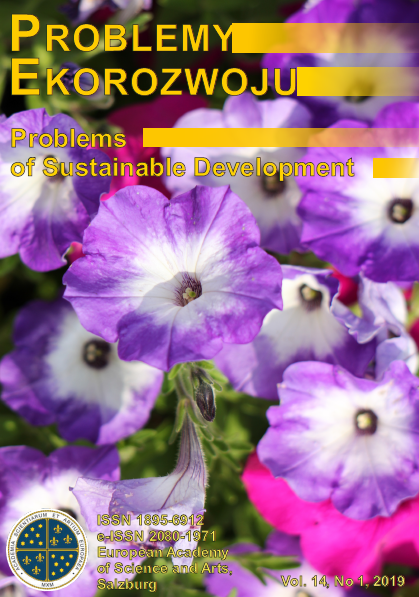Education for All and Sustainable Development: An Empirical Study on Family Cognition and Household Resource Using in China
Article Sidebar
Issue Vol. 14 No. 1 (2019)
-
An Updated Assessment of the OECD’s Quality of Life Index
Mehmet Nar, Mehmet Şükrü Nar7-18
-
Environmental Welfare: Quality of Policy vs. Society’s Values
Oleksandr Dluhopolskyi, Victor Koziuk, Yuryi Ivashuk, Yuryi Klapkiv19-28
-
Sustainable Development in Asian Countries – Indicator-based Approach
Bartosz Bartniczak, Andrzej Raszkowski29-42
-
Age Structures and Air Pollution: What Role Does Gender Play?
Jiliang Liu, Wei Wang, Yin E Chen, Chun-Ping Chang43-52
-
Social Dimensions of Sustainable Development in International Public Opinion
Paweł Rydzewski53-62
-
Mechanism of Strengthening Social and Labor Potential of Sustainable Development
Olga Novikova, Yaroslav Ostafiichuk, Olena Khandiі63-72
-
Education in Defence of Biodiversity. Will the Ecological and Ethical Footprint Counteract Environmental Changes?
Ignacy S. Fiut, Marcin Urbaniak73-78
-
Environmental Life-Cycle Analysis as a Tool for Sustainability Studies: A Complete Learning Experience
G Venkatesh79-85
-
Landscape and Health in Sustainable Development
Sebastian Bernat87-96
-
Sustainable Creative Economy in Cities: Comparative Analysis of Capital Cities in the EU
Barbara Bradač Hojnik97-107
-
Neuroscience in Linguistic Patterns of Communication Campaigns for Environmental Sustainability
Magdalena Saczyna109-118
-
Media Discourses of Mekong Dams: A Thematic Analysis
Claudio O. Delang119-130
-
The Idea of ‘Landscape Cultivation’ by Adam Wodziczko
Leszek Gawor131-137
-
Formation of Theoretical and Methodological Assumptions in the Assessment of Significance of the Bioeconomy in the Country Economy
Kęstutis Biekša, Tomas Baležentis139-148
-
Humanistic Perspectives of Biocultural Diversity
Ryszard F. Sadowski149-158
-
Decoupling Analysis of Energy Consumption and Economic Growth of V4 Countries
Jana Chovancová, Roman Vavrek159-165
-
Theoretical Foundations of Human Capital Education in Economic Growth and Development Management
Franciszek Piontek, Barbara Piontek167-173
-
Environmental Crimes of Early Romanian Communism: Focus on the Enemies of Agriculture
Alexandru-Ionuţ Petrişor, Elena Tîrzman175-184
-
Is the Economic Mechanism of Quantity-Quality Tradeoff Sustainable?
Dariusz Pieńkowski185-198
-
Education for All and Sustainable Development: An Empirical Study on Family Cognition and Household Resource Using in China
Shuxing Chen, Yuxiang Gao199-208
Archives
-
Vol. 16 No. 2
2021-07-01 26
-
Vol. 16 No. 1
2021-01-04 24
-
Vol. 15 No. 2
2020-07-01 24
-
Vol. 15 No. 1
2020-01-02 24
-
Vol. 14 No. 2
2019-07-01 20
-
Vol. 14 No. 1
2019-01-02 20
-
Vol. 13 No. 2
2023-10-15 22
-
Vol. 13 No. 1
2018-01-02 23
-
Vol. 12 No. 2
2017-07-03 18
-
Vol. 12 No. 1
2017-01-02 16
Main Article Content
Authors
Abstract
Education for sustainable development has achieved a lot in the past decade. However, the extent to which sustainable development education can achieve sustainability is still unclear. This article uses the survey data of Chinese families and establishes an empirical analysis model. By using the transition of China’s sustainable development education mode as a recognition strategy and using DID method to analyze this issue, we found out that the sustainable education in schools can only help families correctly understand the status quo of sustainable development, but it cannot improve the household sustainability. After implementing the education for sustainable development for all (ESDFA), the average monthly electricity use of the affected Chinese households has decreased by 79.6124 kWh, which is a drop of 41.56%; household carbon dioxide emissions has decreased by 123.8958 kg, which is a drop of 49.16%. Among them, households with their heads aged 40-55 were the most significant. The mechanism analysis shows that the greater the scope of the population covered by ESDFA, the more obvious the effect of reducing family resource use, and there may be a mechanism similar to the herding effect.
Keywords:
References
DE HAAN G., 2006, The BLK ‘21’programme in Germany: a ‘Gestaltungskompetenz’‐based model for Education for Sustainable Development, in: Environmental Education Research, 12(1), p. 19- 32.
HOPKINS C., MCKEOWN R., 2002, Education for sustainable development: an international perspective, in: Education and sustainability: Responding to the global challenge, 13.
HUCKLE J., WALS A.E.J., 2015, The UN Decade of Education for Sustainable Development: business as usual in the end, in: Environmental Education Research, 21(3), p. 491-505.
KOPNINA H., 2013, Evaluating education for sustainable development (ESD): Using ecocentric and anthropocentric attitudes toward the sustainable development (EAATSD) scale, in: Environment, Development and sustainability, 15(3), p. 607-623.
KOPNINA H., 2014, Revisiting education for sustainable development (ESD): Examining anthropocentric bias through the transition of environmental education to ESD, in: Sustainable development, 22(2), p. 73-83.
LOZANO R., LOZANO F.J., MULDER K., et al., 2013, Advancing higher education for sustainable development: international insights and critical reflections.
SAUVÉ L., 1996, Environmental education and sustainable development: A further appraisal, in: Canadian Journal of Environmental Education, 1, p. 7-34.
UNESCO, 2005, UN Decade of Education for Sustainable Development 2005-2014: The DESD at a glance, Paris.
VARE P., SCOTT W., 2007, Learning for a change: Exploring the relationship between education and sustainable development, in: Journal of Education for Sustainable Development, 1(2), p. 191-198.
WALS A., NOLAN C., 2012, Shaping the Education of Tomorrow: 2012 Report on the UN Decade of Education for Sustainable Development, Abridged, Paris.
Article Details
Abstract views: 76
License

This work is licensed under a Creative Commons Attribution-ShareAlike 4.0 International License.


